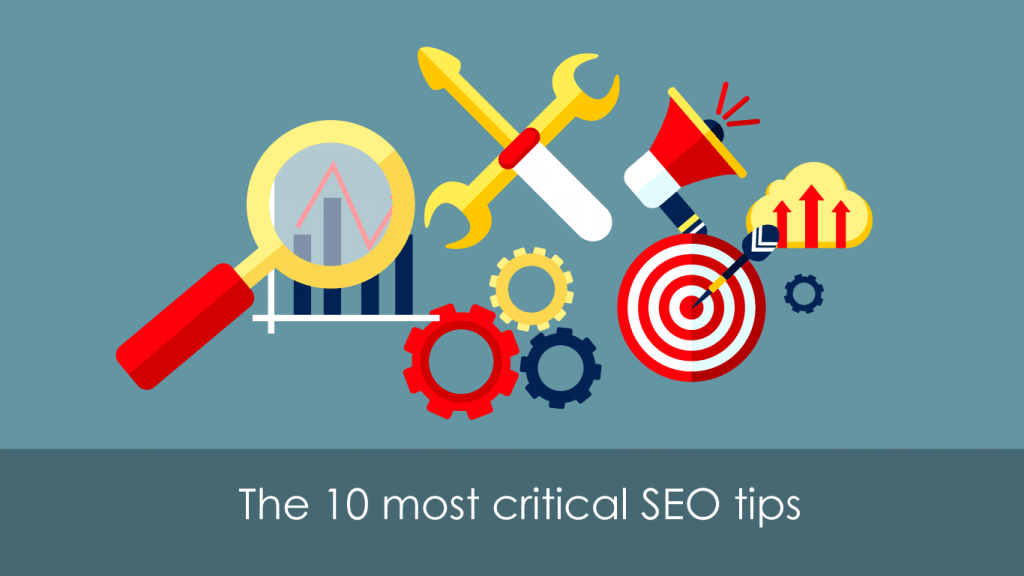What is Search Engine Optimization (SEO)?

Search engine optimization is a methodology of strategies, techniques and tactics used to increase the amount of visitors to a website by obtaining a high-ranking placement in the search results page of a search engine (SERP) — including Google, Bing, Yahoo and other search engines. (Source: Webopedia).
Getting started with SEO
There are some ‘on page’ activities that you can do such as producing good content (making sure it includes relevant keywords), making sure your pages are well structured (for example, including meta information) and has a good page title with all of the images properly tagged.
There are also some ‘off page’ actitivities such as having an XML sitemap in place, setting up your Google Search Console account, website speed optimisation and a good overall technical structure (the way your web pages are programmed)
10 Top Tips
So here are our 10 priority areas to think about first:
Every search on the web starts with the user entering some keywords into the search engine. To make sure your keywords are relevant, you need to start with some keyword research – actually checking what search terms people are using is vital to make sure you are using the right ones.
You can do this using the free Google AdWords Keyword Planner to see what keywords are getting the most searches, related searches and other keywords insights.
Your page title is one of the most critical ranking factors. You should include your keywords naturally and it should ideally be less than 65 characters (about 10 words)
Optimized URLs – your ranking will be improved if you use keywords in your URLs. It is best practice to include hyphens to separate words and ideally less than 100 characters in length.
Meta Description – most search engines will use the meta description to describe your page in the search results. You should use as many relevant keywords as possible and aim for less than 160 characters.
The only way to get keywords onto your website in a meaningful way is to produce relevant content – with SEO, content really is king. If you don’t have content containing the right keywords, then you are definitely not going to appear in the search results.
Search engines are constantly crawling the web looking for good content – not just any content…but good content that provides real value to users.
Ideally, your pages ought to be between 500-1000 words in length. That way, the article is long enough to be useful (and include enough keywords for your SEO) but not too long for people to read.
There is no optimal keyword density (like there used to be) but if you use keywords naturally within your marketing copy, it will naturally rank higher.
Headings are used by many search engines to identify the topic of different sections within your page.
Using keywords in the main page heading (H1 heading) and sub-headings (H2 heading) will help define your page topic to search engines and they are often given greater weighting in search ranking algorithms.
All images on your page should have the ‘Alt’ attribute completed – ideally containing relevant keywords to the page topic. This will add relevant text to your web page’s source code that search engines will index.
Structured data markup – referred to by Google as ‘Rich Snippets’ is becoming increasingly important for SEO. Other services also have their own version of structured markup on your pages (such as Twitter Cards).
Basically, this allows you to include information on your web pages that search engines and other sites such as Twitter will use to display your page information.
This is an evolving area of SEO with the development of schema.org and emerging standards for what is now called ‘microdata’.
For further information, please see the following resources:
Apart from making your website easier to use, an easy way to boost traffic to indivual pages within your site is to link between them.
Never use ‘Click here’ as the link – make sure the text of the link that you include use relevant keywords as this will make that page more likely to appear with that keyword.
As with everything to do with SEO, do not overdo it as it will be treated as ‘cheating’ – use links naturally within your pages and make them useful to your readers.
You should create a sitemap – a page listing and linking to all of the main pages, sections and categories within your website. This makes it easier for search engines to index your website.
For further information on creating a sitemap, please read our article on Getting started with Google Search Console which includes a section on creating and submitting your sitemap to Google.
